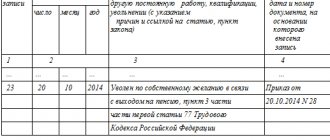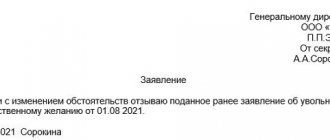Features of a fixed-term contract
When concluding a fixed-term contract with an employee, you must be guided by Part 3 of Art. 79 Labor Code of the Russian Federation. It stipulates that such an agreement can be terminated at the end of the period of absence of the main specialist. In order for the hiring and dismissal of a temporary worker to comply with the requirements established by Russian legislation, when registering them, one must adhere to the rules enshrined in the orders of the Ministry of Labor.
If a person is hired to replace an employee who has gone on maternity leave, a fixed-term employment contract is concluded with him. It is not advisable to indicate its end date or validity period, since maternity leave can be extended in some cases, and a specialist has the right to interrupt maternity leave at any time.
Legislative acts do not indicate that an employee who wishes to return to work from maternity leave is obliged to notify the employer of her intention in advance. Therefore, when concluding an agreement with a temporary specialist, it is best to indicate as the deadline the day preceding the departure date of the main employee.
This measure will allow the dismissal of a person hired temporarily in accordance with the law and will prevent a situation in which two employees find themselves in the same position. In addition, in this case, the replacement specialist will not be able to challenge or recognize the termination of the employment relationship as illegal.
The end of the employment contract is considered to be the time the main employee returns to work. In paragraph 2 of Art. 77 of the Labor Code of the Russian Federation established that this basis is weighty enough for the labor relations of the parties to be terminated.
It should be noted that the employer is not obliged to warn the temporary specialist about dismissal, since he, when signing a fixed-term contract, is aware of the characteristic features of the document, in particular the grounds for its termination. Under these conditions, human labor rights are not violated.
Temporary transfer regulations
As noted above, transferring an employee to another workplace implies compliance with certain regulations, like any other legally significant action:
- at the first stage, the employer must notify the employee of the need to transfer the enterprise employee to another workplace. To do this, the employer forms either a written request or outlines the need orally.
- Next, an agreement between the parties is formed, modifying the terms of the employment contract, which must be signed by the two parties to the legal relationship. The agreement contains comprehensive information about working conditions: the amount of wages, the length of the working day, the transfer period, etc.
- Once the agreement is signed, the employer can issue an order to transfer the employee for a specific period. The order must be presented in a unified form established by the labor legislation of the Russian Federation. In particular, the order is issued in standard form N T-5 or N T-5a.
- The order must be sent to the employee for review, after which he certifies that he has read the document with his signature.
However, it should be noted that the regulations for the temporary transfer of an employee, when his consent is not required, have different conditions. In particular, the employer initially issues an official order to transfer the employee, within the framework of which such a need is justified. The order has the same unified form N T-5 or N T-5a.
But in such situations, the order must be supported by additional documents that determine this need. If such documents are missing, the order will not have legal force, and the employee will be able to refuse the transfer legally. If the legal regulations are followed, an additional agreement is signed and attached to the current employment contract.
Nuances of termination
Although the process of firing a replacement employee is quite simple, sometimes there are some difficulties during its implementation. This usually happens if the person falls into one of the following categories:
- Part-timers. An employee working part-time internally or externally can perform the duties of two specialists at the same time. In both cases, an employment contract is concluded with a part-time worker only for the period of absence, for example, on maternity leave, of the main employee. Such a specialist is dismissed either upon expiration of the agreement or early in connection with the return of the official.
- Employees who have taken maternity leave. If a woman replacing an absent employee goes on maternity leave, then she must receive all payments established by law. But at the same time, the employer retains the right to fire her as soon as the main specialist goes to work and officially begins to perform her duties.
- Pregnant women. When the question concerns termination of relationships at the initiative of the employer, women expecting a child are considered one of the most protected categories of workers. They can only be fired in extremely rare situations. Nevertheless, the end of the employment agreement refers to circumstances independent of the will of the parties, and therefore a temporary employee can be fired even during pregnancy. But it should be remembered that before terminating the contract, the manager is obliged to offer this woman other vacancies available in the organization that might suit her. Moreover, the new workplace may have lower wages or lower qualifications.
- Employees on vacation. In this case, the date of dismissal is considered to be the employee’s last day of rest. At the same time, delaying the completion of the employment agreement is not considered a basis for extending the contract for an indefinite period. Payment of vacation pay must be made before the start of the vacation.
- Employees who are on sick leave. By law, such an employee should be dismissed on the last day of illness. This date is indicated on the sick leave certificate. The dismissed specialist must, upon settlement, receive all payments due to him during his illness.
The employer should take into account the listed nuances in the process of terminating cooperation with a temporary employee. Failure to comply with them may become the basis for challenging the employer’s actions in the state labor inspectorate or judicial authorities.
Rules and procedure
The general rules for dismissal, which must be followed, are established in Art. 79 Labor Code of the Russian Federation. The process of terminating employment begins from the moment the employer receives a statement from a permanent specialist that he is going to begin his duties. This document is drawn up in any form. In addition, the employee sets the exit date independently.
Grounds for dismissal
The basis for dismissal of a temporary employee is the completion of a fixed-term employment agreement, which ends after the conditions specified in it are met. These conditions include:
- completion of the work specified in the contract;
- return of the main employee, in whose place a temporary worker was hired;
- the end of seasonal work, if a specialist was hired to perform it.

When agreeing to short-term employment, a person must be clearly aware that the employment contract will end after the conditions listed in it are met. If the cooperation between the employer and the specialist continues after the end of the agreement period, the contract is considered extended for an unlimited period.
Return of a permanent employee
An order that a permanent employee resumes his duties can only be issued on the basis of a personal statement from this person. The order must indicate:
- the fact that a specialist is employed on a permanent basis;
- start date of work;
- employee work schedule;
- instructions for the accounting department on the calculation and payment of salaries.
The completed order must be signed by the employee who returns to perform his official duties. In addition, the document must be registered in the appropriate accounting journal.
Temporary worker notification
The replacement specialist can be notified of the upcoming completion of the fixed-term agreement by an act. This document is drawn up in any form until the end of the employment contract. It should contain information such as:
- reason for termination of cooperation;
- link to the Labor Code;
- date of dismissal;
- last name, first name, patronymic of the director and his personal signature;
- last name, first name, patronymic of the employee.
The act must be registered in the order journal and assigned a number. The replacement employee should be familiarized with the document for signature. After this, the employee must provide the employer with a receipt indicating that he was notified of the date of dismissal.
If necessary, the act can be sent by registered mail with notification. When choosing this delivery method, do not neglect compiling an inventory of the attachment. A postal receipt serves as confirmation of the notification being sent. Please note that the employee must be notified of the upcoming dismissal the day before the return of the main employee.
Recruitment
In order to begin the procedure for registering an employee for a vacant position for a clearly established period, the employer must prove that such activity is truly temporary in nature or is provided for by law. Among the key conditions of this type of agreement, the following should be highlighted:
- consent of the parties to this type of labor relationship;
- period of validity of the agreement (clear start and end dates);
- the conditions that served as the basis for determining the duration of the employment agreement;
- availability of a trial period (only for contracts whose duration exceeds 2 months).
Employment under a temporary document has some peculiarities. It is advisable to highlight these. At the time of writing an application for employment, the employee is obliged to indicate the start and end dates of his future work activity, as well as the reason why he agrees to such working conditions.
Making an order
The end of an employment agreement is always formalized by an order for the dismissal of a temporary employee due to the departure of the main specialist. The following information must be available:
- Organization name, legal address and telephone number.
- Number and date of the order.
- Link to a fixed-term employment contract indicating the number and date.
- Reason for ending the collaboration.
- Director's signature.
- Company seal.
- Personal signature of the employee, which confirms his familiarization with the document.
The legislation of the Russian Federation establishes that an order can only be executed in writing. The procedure and rules for drawing up an order of this kind should be enshrined in the local regulatory documents of the organization.
It must be taken into account that the absence of such an order is grounds for declaring the dismissal illegal. Therefore, in the event of a labor dispute, the employee will be able to turn to the labor inspectorate or judicial authorities to protect his rights. Typically, after this, the employee is reinstated and compensation payments are made. To prevent such situations, it is especially important to draft an order in accordance with the law.
Advantages and disadvantages
Cons: Please note! The fact of temporary work must be recorded in the work book. However, if it does not exceed five days, then this is not necessary.
In terms of basic guarantees and rights of workers, there should be no differences with those employed on the condition of indefinite employment. Temporary workers have the right to vacation, normal working hours, and wages. They are provided with special clothing and personal protective equipment, and are subject to all local regulations of the enterprise and regulations on labor protection.
Final payment
Calculation with a specialist must be carried out in accordance with the norms and rules provided for by legislative acts. Thus, the resigning employee should be paid the following amounts:
- salary for the last time worked;
- compensation for unused days of annual leave;
- severance pay.
The employee must receive all required payments on his last working day.
If the issuance of funds is impossible, and the reasons for this situation are recognized by law as valid, then the payment must be made no later than 24 hours after the employee makes the corresponding demand. Money can be transferred to a specialist’s bank card, to his personal account, or transferred personally through the organization’s cash desk. If this does not happen, the director of the enterprise faces administrative liability.
Entry into the work book
The work book is one of the fundamental documents.
Every employed Russian citizen should have it. If an employee gets a job for the first time, then his employer is obliged to properly prepare the specified document. When making an entry in the work book of a resigning specialist, you must indicate the name of the enterprise, as well as the number and date of conclusion of the employment agreement. In addition, upon termination of the employment relationship, the director of the enterprise is obliged to indicate the reason for the termination of cooperation. To do this, a reference should be made in the work book to the corresponding article of the Labor Code of the Russian Federation. It should also indicate the number of the order according to which the relationship between the employer and the employee ends.
Drawing up a fixed-term employment contract allows you to replace an employee who is temporarily absent with another specialist. However, the employer can legally fire such a person when the main employee decides to begin his duties. But we must remember that the process of ending the relationship with a temporary worker must comply with the standards enshrined in the labor legal acts of the Russian Federation.
Temporary transfer without employee consent
If we turn to the letter of the law, it is possible to transfer an employee to another place of work without obtaining his consent. This possibility is due to a number of reasons, which, in general, copy the grounds for transferring an employee by agreement of the parties:
- disasters that can be either man-made or natural;
- accident at work or accidents during the performance of professional duties stipulated by the employment contract;
- flood, fire or, for example, an epidemic;
- other conditions that threaten the lives of the population, including the workforce.
However, when transferring an employee to another place without consent, it is also possible, according to labor legislation, and in cases where:
- there is downtime caused by man-made, economic or production problems;
- there is a need to preserve the organization’s property and prevent its damage or complete destruction;
- It is necessary to temporarily replace an employee of the company.
It should be noted that all these grounds must be determined by an emergency situation, and not by the personal desire of the employer. Only in this case will such a translation be fully justified and legitimate.









